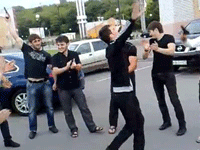Do immigrants want to integrate at all?
 The problem of migrants in Russian cities is one of the most serious and subtle issues that Russia has to deal with today. To reduce the public tension, authorities urge guest-workers to assimilate. However, it seems that all the appeals remain either ignored or unnoticed. Is it really hard to become integrated into another culture, or is it the matter of people's unwillingness to do it?
The problem of migrants in Russian cities is one of the most serious and subtle issues that Russia has to deal with today. To reduce the public tension, authorities urge guest-workers to assimilate. However, it seems that all the appeals remain either ignored or unnoticed. Is it really hard to become integrated into another culture, or is it the matter of people's unwillingness to do it?
The discussion regarding the so-called code of behavior for immigrants from former Soviet republics is not new at all. On the one hand, Russia is a multi-national and multi-cultural nation, which means that the Russians are supposed to welcome and accept cultural peculiarities of other people. On the other hand, when a lot of people representing one culture move to those representing a completely different culture, they both start feeling very uncomfortable.
To exemplify the problem, one may resort to Muslim holidays. When you see thousands of Muslims gathering near the central mosque on Prospekt Mira in Moscow, you may forget that you are staying in the capital of Russia.
In June of 2010, the chairman of the committee for inter-regional relations and national politics of Moscow, Mikhail Solomentsev, said that the Moscow authorities were developing the body of rules which would help immigrants during their stay in the city.
"For the time being, there is a set of unwritten rules, which immigrants are supposed to stick to in Moscow, For example, it is forbidden to slaughter sheep in public places, to make barbecue meat on the balcony, to wear national clothing in public, and so on," Solomentsev said.
The remarks from the official caused quite a controversy in the Russian society. The majority of Muscovites, however, supported the initiative.
The largest problem, which most immigrants face in Moscow, is connected with their ability to speak Russian. According to the Migration Research Center, only 50 percent of guest-workers have the basic knowledge of Russian. That knowledge is enough to fill in official documents. Twenty percent of immigrants do not know the language at all.
Elena Babich, a deputy from the legislative assembly of St. Petersburg, said that she had been culturally shocked when visiting a local market in the city.
Another cultural peculiarity, which may not only raise eyebrows but lead to much more serious consequences, is the fondness of young men from the Caucasus for performing their national dance routines in the streets. Traditionally, the men shoot their guns in the air during the dance known as lezginka.
When immigrants come to Moscow from small villages, they very often lose their heads in big cities. Big city is full of temptations, and your relatives and friends will not condemn you if you get carried away by temptation. Too much freedom may drive some people crazy.
Not so long ago, a 36-year-old national of Uzbekistan attacked a female police officer in the Moscow metro. Being drunk, the man was insulting other passengers. The officer asked him to follow her to the police station. As a result, the woman suffered a brain concussion and bruises of soft tissue of her face.
The Russian Orthodox Church is going to be actively involved in the solution of all of the above-mentioned problems. It is particularly planned to open integration centers for immigrants, where the latter would be able to study the Russian language, first and foremost.
Will immigrants be willing to attend such centers? Will they ever be willing to integrate? It is possible to help a person only when this person wants to be helped.
Ksenia Obraztsova
Pravda.Ru
Subscribe to Pravda.Ru Telegram channel, Facebook, RSS!





